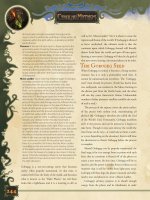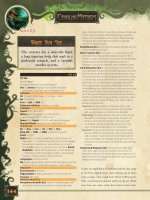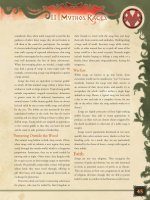Sandy petersens cthulhu mythos 315
Bạn đang xem bản rút gọn của tài liệu. Xem và tải ngay bản đầy đủ của tài liệu tại đây (266.95 KB, 1 trang )
of Constitution drain otherwise. The cursed creature
a sphere reaches maturity, it dissolves and the colour
can only suffer this effect once in any single 24 hour
spreads, tainting nearby life-forms with its shade.
period. As with the colour-curse, this effect cannot
drain a creature to less than 1 Constitution.
underground, affecting plants first. Small plants like
A colour out of space cannot be directly harmed
flowers or grass take on the Color’s tint, while trees
or attacked itself. Within an area of natural sunlight
and larger plants manifest the hue in their blossoms or
or each round the colour within sunbeam or sunburst
fruit. The colour’s effects may cause plants of all sorts
effects, the save DC to resist the colour’s curse is
to writhe unnaturally at times.
reduced by 5. Wish and miracle can destroy a colour
The colour also spreads unnatural fecundity in the
out of space, and any effect that removes curse effects,
area: plants and animals become immensely productive.
if cast directly on the colour itself, has a 1% chance per
Domestic animals all become pregnant with twins or
caster level (maximum of 20%) of destroying the colour
more offspring, fruit trees bear vast quantities of huge
(if the attempt fails, the caster is automatically colour-
fruit (always somewhat malformed). Crops subject to
cursed). At the GM’s discretion, rare rituals to banish
this growth have a foul, bitter flavor, as does the meat
the color may exist, but these rituals should require
of tainted animals. Only those people who live in the
unusual and dangerous ingredients and reagents.
affected area (and thus are also tainted) can eat them
In most cases, the safest way to “stop” a colour
out of space is to retreat and wait it out, hoping for
its departure.
Life Cycle
Often misunderstood, the colour is not a gas, nor a
plasma organism, nor a spirit. It is in reality a hue, a
tint, though one that does not appear on the normal
spectrum, and as such is almost unimaginable. As a
result, size and mass have no meaning for a colour. The
only way it can interact with creatures of terrestrial
matter is to feed on them.
The colour Out of Space has a complex life-cycle,
only part of which takes place on a planet surface. The
rest is unknown to earthly life and inexplicably alien
in nature.
The colour arrives at its destination in the form
of glass-like spheres buried inside odd plastic-like
meteors. These meteors may be created by the colour
itself, or perhaps the colour simply buries these spores
inside a convenient substance. If a sphere is shattered
prematurely, this destroys the colour inside, which is
one of the few ways it can be defeated. However, if
308
The main mass of the colour typically spreads
without noticing the taste.
After a few months, when the native life has reached
a sort of peak, the colour begins to feed actively.
Typically it does this at night, perhaps because the rays
of the sun harm it. It primarily feeds on animal life,
causing livestock and wild beasts to collapse or deflate.
Enough feeding transforms even the most vigorous
animal into a gray decay. Plants are less-affected, but
they too succumb to rot and ruin.
The higher the mental and spiritual status of a
being, the more slowly they are affected, but also the
more sustenance the colour takes from them. Intelligent
life, particularly humanoids, are the perfect food for
its development.
When the colour has had enough sustenance, it
gathers its strength and beams itself back into space,
like a sort of searchlight. Even this retreat may not
be the end of its predations in the area, however:
sometimes weaker strains of the colour take longer to
develop, and may not be able to leave with the bulk of
the color. They may remain for more seasons—even
years—slowly accruing their strength and plaguing the
countryside.









